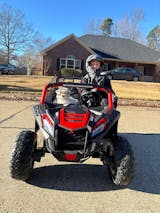Moving past the standard 12V models, both 24V and 48V ride-on cars offer superior power and speed, but they cater to very different needs. The 24V ride-on is the ideal upgrade for older children (ages 6+) seeking enhanced performance and all-terrain capabilities. The 48V model represents the pinnacle of ride-on power, designed for experienced, older kids who demand the highest speed and torque for serious off-roading.
If your child is ready for the next level of adventure, understanding the difference between 24V and 48V is crucial. Let's compare the ultimate power options from Freddo Toys.
Quick Comparison: Freddo 24V vs 48V Performance
| Feature | Freddo 24V Ride-On Car | Freddo 48V Ride-On Car |
|---|---|---|
| Max Speed | Up to 6 MPH (Variable speeds) | Up to 9 MPH or Higher (Highest power class) |
| Best For Age | **Ages 6 - 8** (Requires maturity) | **Ages 8 - 12** (Experienced riders only) |
| Ideal Terrain | Rough terrain, dirt paths, deep grass, inclines | Steep hills, advanced off-roading, superior traction |
| Control | Parental Remote Control **usually included** | Often **driver-controlled only** (for advanced riders) |
When Should I Upgrade My Child to a 24V Ride-On Car?
The 24V model is the perfect jump from a 12V when your child needs more torque and speed.
- Age & Size: Your child is usually 6 years or older and has exceeded the weight limit of the 12V model.
- Driving Skill: They have mastered steering and braking and rarely need parental remote intervention.
- Terrain Needs: You primarily use the ride-on on demanding surfaces like hills, thick grass, or gravel. (Check out our Can-Am line for powerful off-roading).
Is a 48V Ride-On Car Worth the Investment?
The 48V system is designed for the maximum ride-on performance available, often rivaling low-speed electric go-karts. This is a specialized choice for the most dedicated riders.
- Maximum Torque: Offers significantly more pulling power, allowing for better acceleration and climbing capabilities.
- Realistic Experience: Provides the closest experience to driving an actual small electric vehicle, ideal for older children.
- Superior Weight Capacity: Typically supports a higher maximum weight, often allowing for two riders or older/larger children.
Freddo High-Performance FAQ: 24V vs 48V
Here are answers to the most critical questions about high-voltage ride-ons:
1. Q: Are 48V ride-on cars safe for kids?
A: Yes, but only for the specified age range (typically 8+) and skill level. Due to their higher speeds, 48V models should only be used in supervised, open environments away from traffic. Always ensure the child wears a helmet.
2. Q: Do 24V ride-ons use two batteries?
A: Yes, the 24V system is usually achieved by connecting **two 12V batteries in a series**, doubling the voltage. Learn how to care for them in our Battery Maintenance Guide.
3. Q: Which is better for driving on hills: 24V or 48V?
A: Both are capable, but the 48V system is definitively superior for sustained hill climbing due to its higher torque and pulling power. The 24V is excellent for moderate hills and grass.
4. Q: Why don't all 48V models have a parental remote control?
A: 48V vehicles are designed for older, more experienced drivers (8-12+) who have graduated from needing parental override. The focus shifts from remote supervision to teaching responsible driver control, similar to a go-kart.
Conclusion: Ready for the Ultimate Ride?
Whether you choose the high-torque performance of a 24V or the unrivaled speed of a 48V, you're investing in an advanced driving experience.
Safety Tip: Always supervise your child, ensure they meet the minimum age requirement, and wear protective gear, especially with 24V and 48V models.
Explore our Powerful 24V Ride-Ons or View the Elite 48V Collection!

2 comments
2X48v 4X4 CAN AM MAVERICK 2 SEATER RIDE ON UTV FOR KIDS I bought this and did not get a charger with it. I need a charger.
2X48v 4X4 CAN AM MAVERICK 2 SEATER RIDE ON UTV FOR KIDS I bought this and did not get a charger with it. I need a charger.